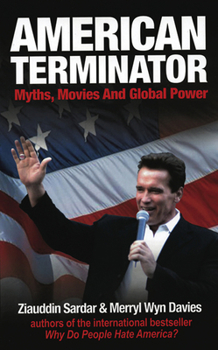American Terminator: Myths, Movies, and Global Power
The bestselling authors of Why Do People Hate America? examine the California Gubernatorial Election of 2003. They posit that it's more than a triumph of a populist candidate--it is a telling... This description may be from another edition of this product.
Format:Paperback
Language:English
ISBN:193285701X
ISBN13:9781932857016
Release Date:October 2004
Publisher:Disinformation Company
Length:240 Pages
Weight:0.79 lbs.
Dimensions:0.8" x 5.1" x 8.0"
Customer Reviews
2 ratings
Insightful
Published by Thriftbooks.com User , 19 years ago
A very fascinating perspective on the American mind. WARNING: If you attribute all things good in the universe to America the beautiful, then you may be offended. If you believe that America can do no wrong, then, yes, you will likely be offended. Gomer Pyle reruns are a safer option for you. If you think the world can use a little improving and you're not too afraid to take a closer look, then, by all means, read the book.
Useful study of illusions
Published by Thriftbooks.com User , 19 years ago
British writers Sardar and Davies have written a fascinating study of US culture, especially of the belief that because they are a good people, they are a force for good in the world. Why then do US interventions abroad produce bad results? The authors explore ten themes: the promotion of fear - `be afraid, be very afraid'; escape (emigration, running away); exceptionalism - believing themselves different from and better than other nations, there is no need to know anything about them; the USA as the idea of nation is everybody's future; everything should be democratically accessible - guns, other people's oil, etc.; the right to be imperial; cinema as empire's engine (not profit then?!); worldwide celebrity as empire's currency; war as needed for origin, identity, consolidation, expansion and hegemony; and the USA's way as universal. The authors explore how Hollywood has given America its idealised image of itself. John Ford's classic Western Drums along the Mohawk (1939) explored the themes of civilising the wilderness by pushing back the frontier, building a new life and a new land by wiping out Native Americans. Frank Capra's Mr Smith goes to Washington (also 1939) presented the USA as the idea of nation, sanctifying the US Constitution, an 18th century document which endorses `the right of property in a slave', does not guarantee the right to vote and does not allow a direct vote for the head of government. Howard Hawks' To have and have not (1944), like Casablanca (1942), gave us Humphrey Bogart as the reluctant hero, symbolising the USA as reluctant superpower. Robert Altman's The player (1992) examined Hollywood, empire and celebrity. Sands of Iwo Jima (1949), starring John Wayne, presented war's psychosis. Universal soldier (1992) portrayed the USA as the global narrative. The authors impute a single culture to the USA, ignoring its working class culture of trade unions, workers' nationalism and opposition to empire. Like the hero of Groundhog Day (1993), the USA is trapped in repeats, of exploitation and war. American workers must reject idealism, take responsibility for running America and throw out their rulers.





